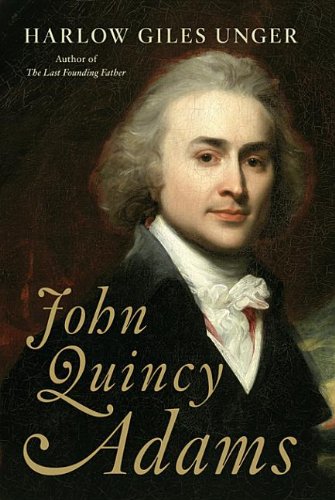
John Quincy Adams
کتاب های مرتبط
- اطلاعات
- نقد و بررسی
- دیدگاه کاربران
نقد و بررسی

June 11, 2012
The son of American icons John and Abigail Adams, John Quincy Adams transcended his parents’ high expectations, serving his country as a 15-year-old diplomat (as secretary to the American minister to Russia), U.S. president, and later, congressman. Unger (The Last Founding Father) asserts that Adams’s positions on abolition and the promotion of science showed him to be prescient, while his outwardly reserved ambition revealed him as a Revolutionary relic whose earnest legal mind garnered him the respect of the fiercely partisan congressmen who surrounded him on his Capitol deathbed. Though Unger oversimplifies the initial American support for the revolutionary French during the elder Adams’s tenure as president, he eloquently details the diplomatic headaches caused by both the infamous XYZ Affair and ever-changing Gallic governments. Spare prose clarifies the overview of political complications and intricate family dynamics, revealing Adams as a historically overlooked yet key transitional figure who witnessed the birth of the nation and endured its nearly irreparable geographic squabbles of the 1840s. Always serving the public with style and conviction, this “towering figure in the formative years” of the nation earned both his parents’ respect and a place in John F. Kennedy’s Profiles in Courage. 43 illus., 4 maps.

May 1, 2012
A neglected president receives his due as a statesman and practical politician. John Quincy Adams (1767-1848), writes Unger (American Tempest: How the Boston Tea Party Sparked a Revolution, 2011, etc.), bridged the years between George Washington and Abraham Lincoln. He ate with Charles Dickens, ended the War of 1812, shaped the ever-so-slightly misnamed Monroe Doctrine, taught at Harvard, and was one of the most prominent abolitionist leaders in the years preceding the Civil War. On top of that, his father was the nation's second president. So why is he not better known? The short answer is that he didn't trumpet his own accomplishments. The longer answer is that American history is so badly taught these days that it seems surprising that anyone remembers Washington, much less Millard Fillmore. Unger's bracing, readable text is a remedy. In the early chapters, the author explores the difficult job of being first son to the Massachusetts first family. In one telling anecdote, John Adams demanded that the boy be admitted to Harvard as a junior or senior, given "his mastery of two classical and three modern languages, and his command of an enormous body of classical and modern literature, philosophy, and science." The doting aside, Adams fils soon cut a political figure all his own, deftly serving as a diplomat and analyst of what today we would call geopolitics. His fruitful term as ambassador to the court of the tsar even led his compatriots in Washington to call him an alien, "especially after John Quincy began walking in the winter weather wearing his exotic Russian fur hat and great coat." Unger writes appreciatively of Adams' considerable accomplishments, even if the voters of the president's own time were less generous, turning him out of office in favor of the restive war hero Andrew Jackson. A fine examination of a life, well deserving a place alongside David McCullough's study of Adams pere.
COPYRIGHT(2012) Kirkus Reviews, ALL RIGHTS RESERVED.

September 1, 2012
While the name John Quincy Adams (JQA) is familiar to most Americans, many general readers do not know more than that he was a president of the United States and related to John Adams. Unger (The Last Founding Father: James Monroe and a Nation's Call to Greatness) seeks to correct that with this in-depth biography. The reader comes to know John Quincy Adams intimately as a son, father, statesman, and patriot, a man who may have been born to greatness yet who adamantly refused to seek it (refusing even to campaign for president). The individuals encountered in the narrative are familiar, but--in the best tradition of David McCullough's biographies--the pace and plotting pull readers forward even though they may know the ending. Unger makes use of many years of JQA's diaries and expertly dissects intricate political and (potentially confusing) family relationships. In all, he succeeds in making clear why JQA was the first subject of John F. Kennedy's Profiles in Courage. VERDICT Unger does a masterful job. Although there are other books on John Quincy Adams, American history and political history buffs will find this stirring work irresistible.--Linda White, Maplewood, MN
Copyright 2012 Library Journal, LLC Used with permission.

August 1, 2012
Had he never been the sixth U.S. president, Adams would nevertheless be significant for his diplomatic accomplishments, which include treaties that ended the War of 1812, fixed the border with Canada, and extended American territory to the Pacific coast. In this general-interest biography, Unger discreetly parks Adams' undistinguished presidency of 182529 between the more interesting periods of his upbringing as the son of John and Abigail Adams and his feisty post-presidency as an abolitionist member of the House of Representatives. Tapping primary documents, Unger chronicles the younger Adams' acute awareness of his parents' expectation of a great future for him that he perhaps felt extra drive to achieve due to the premature, alcoholic deaths of his brothers. In any event, Adams' lineage and native linguistic ability earned him diplomatic appointments by every president from George Washington to James Monroe. On the personality side, Unger modifies impressions of Adams as a snobbish, scholarly cold fish with humanizing quotation of his poetry and correspondence with his wife. Unger's well-presented portrait merits American-history readers' attention.(Reprinted with permission of Booklist, copyright 2012, American Library Association.)

























دیدگاه کاربران